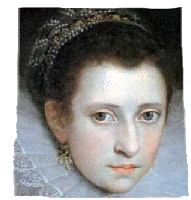May 19: Executed for Adultery
Anne Boleyn Executed (1536):
Churches v. Adultery
It was on this date, May 19, 1536, that Anne Boleyn, the second wife of Henry VIII, was executed for adultery. The story is told in the 1969 film, Anne of the Thousand Days, with French-Canadian actress Geneviève Bujold playing the title role. Anne spent much of her childhood in France, where she learned to speak the language and love French clothing and culture. King Henry found her pleasing and Anne made an advantageous marriage — secretly, in early 1533, while she was already pregnant by Henry. Pregnant with future Queen Elizabeth, as it turned out.
That Pope Clement VII refused Henry's petition for a divorce from Catherine of Aragon, so that he could legally marry Anne, as a rebuke to Henry's "lust," is false — Catherine simply was unable to give Henry the heir he desired. Clement had granted divorces in many other cases on grounds less serious than the creation of an heir for the royal succession. In fact, Clement's hands were tied (almost literally) by the threatening proximity of Catherine's cousin, Charles V.
For Henry, an heir was not good enough: Anne failed to produce a male heir, and so her enemies at court plotted against her, taking their cue from the frustrated Henry's newfound lust for Jane Seymour. Anne was arrested on May 2, 1536, and charged with adultery and other crimes. At 8:00 on the morning of May 19, 1536, Anne made a short speech full of Christian sentiments, then a swordsman from Calais severed her head from her body. In an interesting lapse of logic, shortly before Anne's execution, her marriage to the King was dissolved and declared invalid — so the charge of adultery was mooted. Anne denied the charges, but the testimony of tortured witnesses was enough.
It is instructive to note that adultery was treated by ancient civilizations as a property crime, with punishment benefiting only an injured husband. In ancient Egypt, the "Tale of Two Brothers" shows that adultery was condemned; the story of Potiphar's wife was adapted from that tale to illustrate a similar condemnation in the Old Testament. Augustus Caesar sentenced his beloved daughter (Lex Julia) to exile for the same immoral conduct.
Adultery is addressed by the Seventh Commandment, but, outside of fundamentalist Christian or Muslim circles, the penalties for adultery are not so drastic, if there are any at all beyond the ones which may naturally follow: destroyed marriages and social disdain. In fact, our modern, secular society sees adultery rarely punished in law, except as grounds for divorce. And the injury is considered equally grievous for a husband or a wife. Yet the "property crime" mentality persists, as evidenced in the 2002 film Unfaithful, in which the aggrieved husband kills his wife's lover, not his wife.
The true punishment for adultery lies in the compromise of trust, where it ought to, and not in the official castigation of the culprits, who harm only themselves. Plainly, the church has no business bullying the state into the bedrooms of consenting adults. And in the case of Anne Boleyn, one might think divorce a lesser crime than execution, but that wouldn't have been the "Christian" thing to do.
Originally published May 2003 by Ronald Bruce Meyer.


